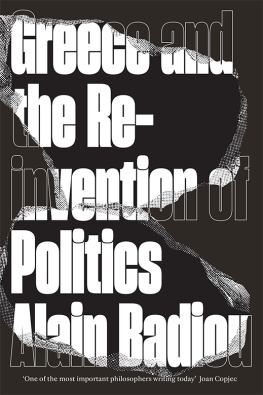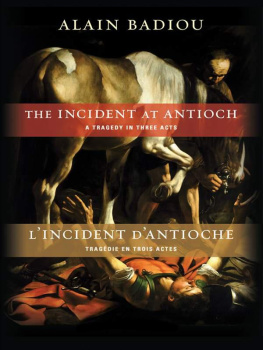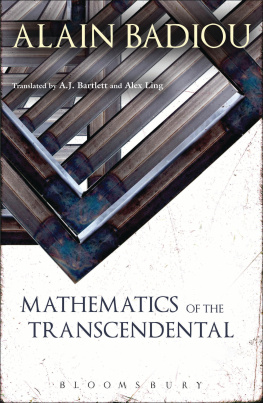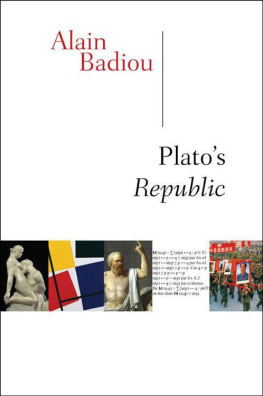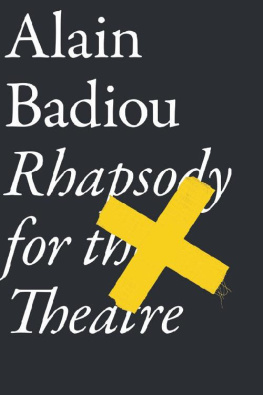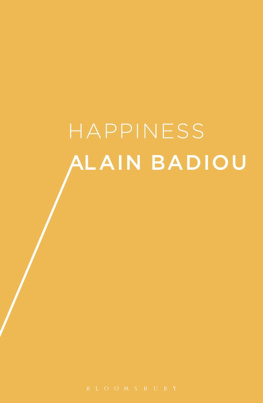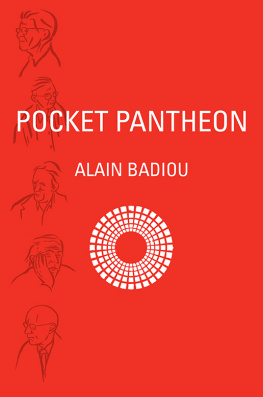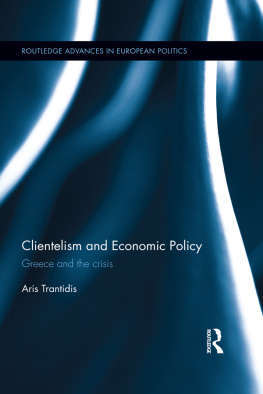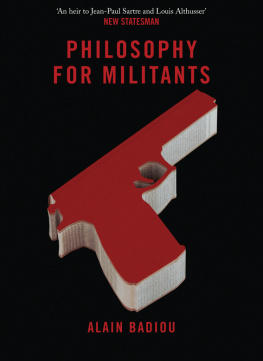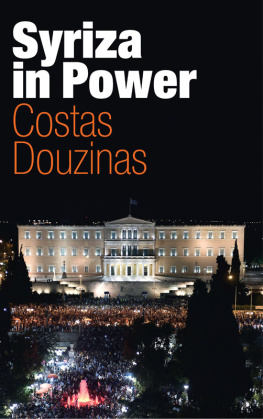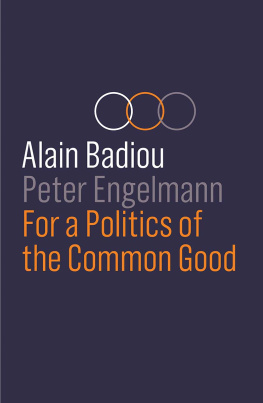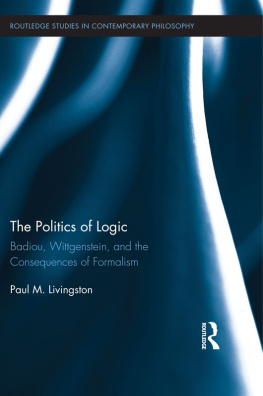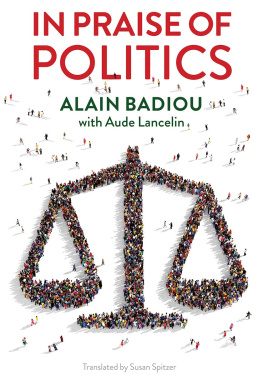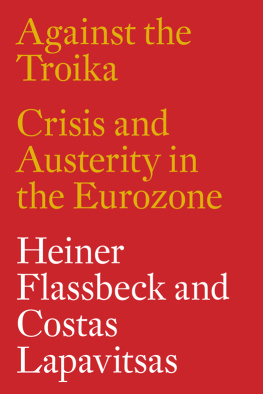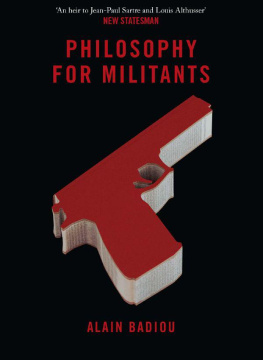Greece and the
Reinvention of Politics
ALAIN BADIOU
Translated by David Broder

This book is supported by the Institut Franais (Royaume-Uni)
as part of the Burgess Programme (www.frenchbooknews.com)

First published in English by Verso 2018
Translation David Broder 2018
First published as Un Parcours Grec
Editions Lignes 2016
All rights reserved
The moral rights of the author have been asserted
1 3 5 7 9 10 8 6 4 2
Verso
UK: 6 Meard Street, London W1F 0EG
US: 20 Jay Street, Suite 1010, Brooklyn, NY 11201
versobooks.com
Verso is the imprint of New Left Books
ISBN-13: 978-1-78663-417-7
ISBN-13: 978-1-78663-495-5 (LIBRARY)
ISBN-13: 978-1-78663-419-1 (US EBK)
ISBN-13: 978-1-78663-418-4 (UK EBK)
British Library Cataloguing in Publication Data
A catalogue record for this book is available from the British Library
Library of Congress Cataloging-in-Publication Data
Names: Badiou, Alain, author.
Title: Greece and the reinvention of politics
/ Alain Badiou ; translated by
David Broder.
Other titles: Parcours grec. English
Description: Brooklyn : Verso, 2018.
Identifiers: LCCN 2017038187 | ISBN 9781786634177
(pbk.) | ISBN 9781786634955
(hardback/library)
Subjects: LCSH: Greece Politics and government 20th century. |
Greece Politics and government 21st
century. | Democracy Greece.
Classification: LCC JN5059 .B3413 2018 | DDC 320.9495 dc23
LC record available at https://lccn.loc.gov/2017038187
Typeset in Sabon LT by Hewer Text UK Ltd, Edinburgh
Printed by CPI Group (UK) Ltd, Croydon, CR0 4YY
Contents
I
In a country like France, the present is a disoriented time. This has been the case for almost three decades. By disoriented time I mean a time that does not offer its youth, and in particular the working class among them, any principle to orient their existence.
In what exactly does this disorientation consist? Certainly one of its more important functions is to render the previous sequence unreadable a sequence that was, indeed, oriented. This is a function characteristic of all periods of reaction and counter-revolution, including the one that we have been experiencing since the late 1960s. For example, we could note that the specificity of the Thermidorian reaction of 1794 after the 9 Thermidor plot and the execution without trial of the great Jacobins was that it made the prior Robespierrian sequence unreadable. Reducing that sequence to the pathology of a few bloodthirsty criminals was a way of forbidding any political understanding of it. This view of things lasted for decades and was intended to disorient in a lasting way the people, who were considered, as they still are today, to be potential revolutionaries.
Making a period unreadable requires a lot more than simply condemning it. This is because one of the effects of unreadability is a prohibition against finding, within the period concerned, the very principles that might overcome its impasses. If the period is declared pathological, then no principle of orientation can be drawn from it. The conclusion, whose deleterious effects we see every day, is that we have to resign ourselves to disorientation, taking it for a lesser evil. So let us propose that a prior and visible closed sequence of the politics of emancipation must remain readable to us independently of whatever final judgement we pass upon it.
In the debate during the Third Republic (18711940) on the rationality of the French Revolution, Clmenceau put forward his renowned formula that the Revolution forms a single bloc. This formula is remarkable for asserting the integral readability of the revolutionary process, whatever the tragic peripeteias of its development. Today, it is clear that when the ambient discourse transforms the preceding sequence into an opaque pathology, what it is making unreadable is communism. So I will take the liberty of saying that the communist sequence including all its shades identifying with the same Idea, both in power and in opposition itself forms a single bloc.
II
What, then, might be the principle and the name of a true orientation today? Out of fidelity to the history of the politics of emancipation, I in any case propose to call it the communist hypothesis. Let us note in passing that our critics claim the word communism has been kicked into the long grass on the pretext that a seventy-year-long experience of state communism tragically failed. What a joke! We are talking about a struggle to overthrow the domination of wealth and the inheritance of power that has lasted for millennia and they object by invoking seventy years of uncertainty, violence and impasse. In truth, the communist idea has passed through only a tiny portion of the time of its testing, of its coming-into-effect.
What is the communist hypothesis? It is defined by three axioms.
Firstly, the egalitarian idea. The commonplace pessimism, again dominant in these times, is that human nature dooms us to inequality. Yes, its a shame that things are like this, but its essential that, once weve shed a few tears over it, we persuade ourselves that this is how things are and accept it. Communisms response to this is not exactly to propose equality as a programme as if to say, lets realise the fundamental equality immanent in human nature; rather, it declares that the egalitarian principle allows us to distinguish, within any collective action, that which is consistent with the communist hypothesis and thus really valuable, from whatever contradicts that hypothesis and thus leads us back to an animalistic vision of humanity.
Secondly, there is the conviction that the existence of a separate, coercive state is unnecessary. This is the thesis common to both anarchism and communism of the withering away of the state. There are societies without a state, and it is rational to postulate that there could also be others. But, most importantly, we can organise popular political action without subjecting it to the idea of power, of representation in the state, elections, and so on. The liberating constraint of organised action can be exercised outside the state. We have very many examples of this, including recent ones.
The third axiom: the organisation of labour does not imply the division of labour, the specialisation of tasks, and in particular the oppressive differentiation between intellectual and manual labour. We should and we can aim at an essential polymorphy of human labour. This is the material basis for the disappearance of classes and social hierarchies.
These three principles constitute not a programme but maxims for orientation; maxims that anyone can adopt as operators for evaluating what they do and say, personally or collectively, in relation to the communist hypothesis.
III
The communist hypothesis has known two great stages, and I would propose that we are now entering into a third phase of its existence.
It first established itself on a major scale between the revolutions of 1848 and the Paris Commune of 1871, when its dominant themes were those of the workers movement and insurrection. Then came a long interval, extending over four decades between 1871 and 1905, which corresponded to the apogee of European imperialism and the organised carve-up of many regions of the globe. The second sequence of the effectuation of the communist hypothesis extended from 1905 to 1976 the end of the Cultural Revolution in China. Its dominant theme was that of the Party, with its greatest (and incontestable) slogan: Discipline is the only weapon of those who have nothing.

